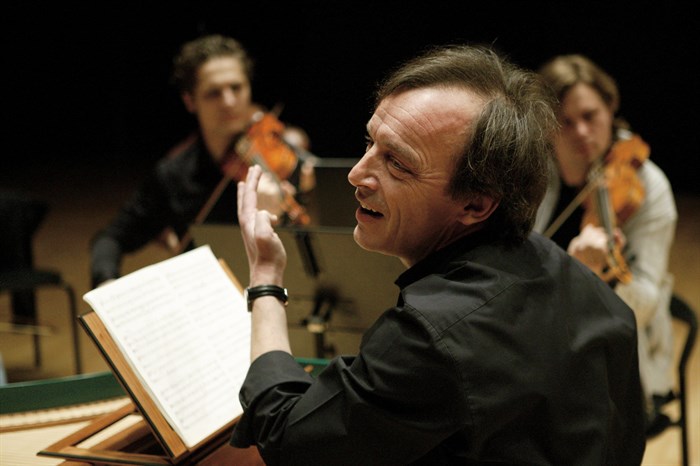Léonie Sonning Prize 2007
Lars Ulrik Mortensen received the Léonie Sonning Music Prize of 600,000 Danish kroner at a concert on 2 June 2007 at the Royal Danish Theatre’s Old Stage. The concert, attended by Prince Henrik, was broadcast live on the Danish Broadcasting Corporation’s P2 radio channel.
The prize was given by Amalie Malling, a member of the Léonie Sonning Music Foundation’s board. Her personal address included the following comments:
‘In 1969, the Royal Danish Opera staged Benjamin Britten’s opera The Turn of the Screw, and the Briton was presented with the Sonning Music Prize at one of the performances. The 12-year-old boy selected from the Danish Radio Boys’ Choir to sing the role of Miles was Lars Ulrik Mortensen. So it’s probably not too far fetched to say that you can feel history repeating itself as it is now your turn to receive the award.’
‘When you and the harpsichord finally found each other, it was as if your entire musical universe had fallen into place. You have spoken of how this new sound struck you like great force, how you were captivated by this magical, unknown world of sound, and transported by it. At the same time, you became engrossed in early music, and it dawned on you how unconventional, how radical and how innovative this music is. You remain as fascinated by your harpsichord and obsessed with exploring and performing early music. Your ability to communicate directly with your audience is contagious; you make music an experience felt here-and-now. That is due to your rare gift, which is to make us feel that we are present in the moment the music is being created.’
citation
The Léonie Sonning Music Prize 2007 of 600,000 Danish kroner is awarded to the harpsichordist and conductor Lars Ulrik Mortensen in recognition of his work opening a whole generation’s ears and minds to early music with ardent and uncompromising commitment. Mortensen is a fiery soul, gifted with boundless curiosity and great artistic authority and huge imagination. His fabulous stylistic awareness and insight, combined with his mastery of the harpsichord, have made him one of the world leaders in his field.’
Lars Ulrik Mortensen’s speech of thanks to the committee included these comments:
‘In describing my musical activities, Amalie forgot to mention one thing: the word ”play”. Music as play, music as a gift, music as more and more important in a society where the immeasurable, the non-concrete, the spontaneous-abstract paradigm is getting narrower. If the Sonning Prize is to have a wider and longer meaning, then I hope that it will be that which I will be able to contribute in the future: music as play, not as an escape from life but perhaps, in reality, an escape to life.’
You can listen to the entire speech in Danish here:
Programme
Georg Friedrich Händel Water Music, Suite no. 1
Georg Friedrich Händel Organ Concerto op. 4 no. 1 in G minor
Jean-Philippe Rameau Suite from the opera Platée
Performed by
Concerto Copenhagen
Lars Ulrik Mortensen, soloist and conductor
The Music Foundation had organised a series of concerts featuring the prize-winner:
Monday, 4 June at 7.30pm in Vor Frue Kirke, Svendborg
Baroque music on the harpsichord. Lars Ulrik Mortensen solo
Tuesday, 5 June at 7.30pm in Nordjyllands Kunstmuseum, Ålborg
Baroque music on the harpsichord. Lars Ulrik Mortensen solo
Wednesday, 6 June at 7.30pm at Louisiana Kunstmuseum
Baroque music on the harpsichord. Lars Ulrik Mortensen solo
Sunday, 10 June at 7pm in the banqueting hall at Kronborg Castle
Buxtehude: Seven sonatas, op. 1.
For violin, viola da gamba and basso continuo
Lars Ulrik Mortensen, harpsichord
John Holloway, violin
Jaap ter Linden, cello
The daily press wrote, among other things:
Time will tell whether Lars Ulrik Mortensen is musical demigod on a par with Stravinsky, Bernstein, Britten, Celibidache, Shostakovich, Miles Davis, Gidon Kremer, Nicholas Harnoncourt or Per Nørgård. But to a certain extent, the Sonning Prize should also reflect a commitment to the Danish music scene, and here Mortensen has been significant since he gave up his professorship in Munich and returned home. Mortensen encourages his orchestra by mimicking tragic silent films and modern dance, and through linguistic parables that take root and develop in strange, convoluted directions; through that they come to interpretations of baroque music that make polite French court music into a malleable, vivid, organic and pulsating dramatic statement.
(Michael Bo, Politiken, 4 June 2007)
As soon as he shows up at the Royal Theatre’s Old Stage and walks in front of his Swedish-Danish baroque orchestra Concerto Copenhagen, something happens between people – both those on the stage and those in the dark. At that point, Mortensen looks like another recipient of the Sonning Prize: Miles Davis. He makes all the difference, even when he’s not playing. In the suite from Rameau’s Platée, he has only one music stand in front of him. In brief, his famous gifts as a harpsichordist are significant. But are you are soon led to consider everything that is important about the world of music. In a little over twelve years, he has built his orchestra up into a world-class ensemble. He cannot conduct, he claims. But here in the dusty acoustic of the old theatre, even the smallest gesture with his arms makes the biggest difference. No two notes are alike. In two seconds you get more statements than in a two hour symphony concert.
(Søren Schauser, Berlingske Tidende, 4 June 2007)





